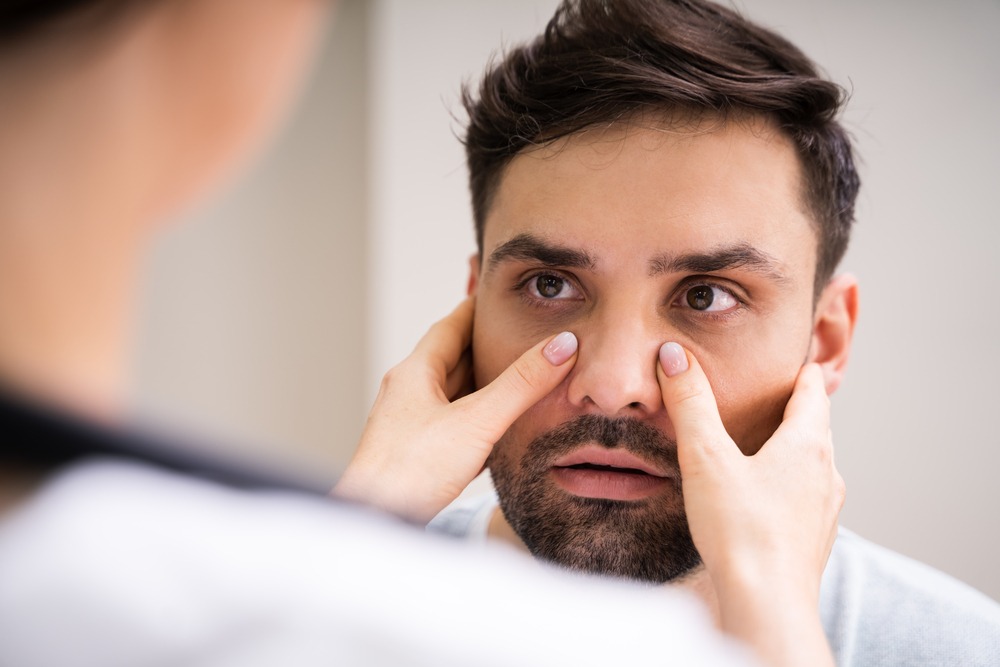Acute sinusitis or inflammation of the nasal and sinus passages that lasts 12 weeks or longer is called chronic sinusitis. Inside of the nose are sinus cavities that are lined with a thin mucus membrane called respiratory epithelium that filters germs, dust, bacteria, pollen, fungi, and other particles and substances from the air that you breathe. When that membrane becomes infected or irritated by triggers, it swells causing the airways in the nose to shrink and mucus to build up. In severe cases, the fluid accumulation, swelling and narrowing of the nasal cavities cause blockage, further hampering proper breathing function and nasal drainage.
Sinusitis symptoms should never be overlooked. They indicate the presence of a serious infection that can spread to other areas of the body, such as the brain, eyes, bronchioles and lungs if it remains untreated. Below is an overview of the most common chronic sinusitis symptoms in the Los Angeles area for which patients seek treatment for at the Southern California Sinus Institute with world-renowned specialist, Dr. Alen Cohen.
Chronic Sinusitis Symptoms

Chronic inflammation and swelling: Ongoing exposure to airborne irritants, allergens, environmental substances, and or inflammatory stimuli enables the infection to spread throughout the body, damaging other organ systems and cause other health concerns. Inflammation can cause your eyes to feel sore and puffy and congestion can make your nose feel stuffy. It can also cause additional infections and sinus headaches and pressure.
Nasal discharge and runny nose: Infection and inflammation irritate the tissues in the nose and sinus cavities and boosts mucus production. Because the mucus is unable to drain freely from the sinus cavities, the discharge may have a cloudy white, yellow, green, or bownish color. It can also mucus to drain down the back of the throat (postnasal drip). The discharge may also have an odor, leading to bad breath. People with chronic sinusitis symptoms and nasal discharge must blow their noses throughout the day and night to help clear their sinus and nasal passageways so they can breathe easier. Persistent nasal discharge and nose blowing can also lead to skin chafing, irritation, and nose bleeds.
Sore throat and cough: The persistent mucus drainage into the back of the throat causes the area to become sore and irritated. The irritation usually triggers a cough, it’s a natural reaction that helps clear phlegm and mucus out of the throat. Persistent coughing taxes the muscles in the throat, causing additional soreness and in some cases voice hoarseness.
Pain and pressure: The pressure and mucus buildup from a chronic sinus infection can become so severe that it causes pain in the facial area (nose, forehead, eyes, and jaw). Pain in the upper teeth and ears are also common. Some people initially confuse head pain with regular headaches or migraines. The pressure can cause a throbbing or dull or sharp sensation that comes and goes. Head pain from chronic sinusitis symptoms and infections can be challenging to manage without medical intervention.
Fatigue, brain fog and breathlessness: People who have chronic sinusitis are unable to breathe as well as they need to, resulting in a decrease in cognitive function. The pain and distress of sinusitis symptoms are often so relentless at night that it can make it extremely difficult for sinus sufferers to sleep because they keep waking up, gasping for air. They must blow their noses throughout the night and use other remedies to gain some measure of relief before they attempt to go back to sleep. They remain tired and less alert. Fatigue and brain fog are very common for people with sinus infections because they spend most of their time fighting the vicious cycle of pain, congestion, and distress. Untreated chronic sinusitis infections may lead to chronic fatigue syndrome.
Taste and smell loss: Anosmia or hyposmia is common when there is so much inflammation in the sinus cavities that the buildup of fluid and mucus decreases one’s ability to taste and smell. The effects can become permanent in severe chronic infections.
Decrease in quality of life: Chronic sinusitis symptoms can make life miserable, the longer it remains untreated. The effects can permeate every aspect of your life. Severe, continuous sinus infections can make it difficult to breathe and enjoy life.

Have you ever noticed that your sinus headaches tend to be worse upon waking, on bending or when the weather becomes more unpredictable than usual? Fluid and pressure build-up within the infected nasal tissues tends to increase at night. Once you wake up, the pressure inside of your head slightly changes, but it doesn’t go away. Barometric changes can also affect sinus pressure, leading to an increase or decrease in swelling, pain, and pressure. The longer the sinus infection is present, the worse and more debilitating the symptoms become. Many chronic sufferers spend so much of their time trying to mask their distress and their symptoms that they become less social, more anxious, and have a less than ideal quality of life.
Get Relief and Breathe Clearly
World-renowned ENT specialist, Dr. Cohen, MD, F.A.C.S. wants anyone who is suffering from sinus or sinusitis symptoms in the Los Angeles area to know that they can overcome chronic sinusitis. Southern California Sinus Institute is a premier ENT center that provides safe and effective comprehensive medical and surgical sinus treatments. If you’re tired of feeling miserable due to congestion, or acute or chronic sinusitis symptoms, or would like more information about minimally invasive and multitargeted treatment options, call (818) 888-7878. Dr. Cohen is Los Angeles’ top sinus specialist who is committed to providing effective ENT solutions to dramatically improve patients’ quality of life.

